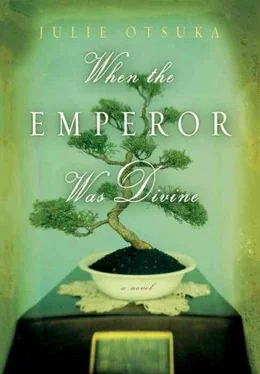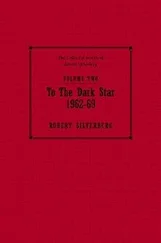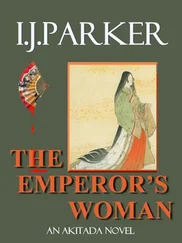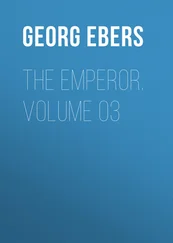“Are you a rich man?”
“Not anymore.” He folded up the handkerchief and put it away. “That’s a nice scarf you’ve got on.”
“My father gave it to me. He used to travel a lot. He bought it for me the last time he went to Paris. I asked him to bring me a bottle of perfume but he forgot. He brought me this scarf instead. It’s very plain, isn’t it?”
He did not answer her.
“He bought himself a pair of shoes while he was over there, too. Fancy ones with little holes punched into the leather. And wooden shoe trees to put inside of them at night.” She looked down at her scarf again. The edges were frayed and worn. “The thing is, I already had a blue scarf. He bought me one the last time he went to Paris.” She sighed. “This isn’t what I really wanted.”
Ted Ishimoto took off his glasses and held them up to the window. “Someday it might be,” he said. He blew on the lenses and then wiped them on his shirt sleeve. “Is your father with you on the train?”
“No,” said the girl. “They sent him away. He was in Missoula for a while and then he was at Fort Sam Houston. Now he’s in Lordsburg, New Mexico. He said there were no trees there.”
“No trees!” said the man and then he shook his head sadly, as though this were a strange and terrible thing. “Does he write to you?”
The door to the lavatory opened and a woman came out and smiled at the girl. “Your turn,” she said.
The girl looked at Ted Ishimoto. “Don’t go away,” she said. She went inside and stared at her face in the mirror above the basin and knew what she saw: a plain girl in a plain blue scarf. She turned on the faucet but the faucet was dry. She tilted her head back and said, “Aaaah,” and then she smiled, but only just a little, and only at the corners of her mouth. She didn’t look like herself when she did that. She looked like her mother, only not as mysterious.
When she came out she held the door open. “My father never writes to me,” she said, even though this was not true. He had written to her every week since his arrest last December and she had saved every single one of his postcards.
“That’s a shame,” said Ted Ishimoto. He reached for the door but she did not let go of it just yet. She pointed down the aisle. “Do you see that lady over there?”
He nodded.
“Do you think she’s pretty?”
“She’s lovely.”
“She’s my mother.
“Your mother is a very beautiful woman.”
“I know. Everyone says that. She’s watching us.”
“That’s her job,” he said. “She’s tired. I can see it in her eyes. Tell her everything will be all right.” He bowed quickly and stepped into the lavatory. “You’ll have to excuse me now.”
The girl let the door go and walked slowly back to her seat. In the middle of the aisle a young girl of five or six was playing with a dirty doll on the floor. The doll had curly yellow hair and big china eyes that opened and closed.
“What’s your doll’s name?”
“Miss Shirley.” The young girl held the doll up shyly. “Mama bought her for me from the Sears catalog.”
“She’s beautiful.”
“You can’t have her.”
“That’s all right.” The girl continued down the aisle. She walked past several snoring passengers and a man who had fallen asleep with a newspaper folded over his face. She saw a young woman reading Burma Surgeon and an older man reading the Webster’s Dictionary and underlining words with a red pencil. She saw two boys fighting for a window seat and a pair of middle-aged women sitting quietly side by side knitting identical pairs of thick woolen socks in preparation for the bitter winter months yet to come.
When the girl found her seat and sat down the old man in front of her turned around and said something to her again, and again she did not know what it was. She wondered where his wife was, or if he even had a wife at all. She looked for his ring finger but his ring finger was one of the fingers that was missing. “What’s he saying?” she whispered to her mother.
“Something about strawberries. He used to grow strawberries.”
“That’s very nice,” the girl said to the old man.
He bowed his head and smiled.
“He doesn’t understand you,” said her mother.
“Yes he does.”
Her mother took out a hairbrush from her purse and said, “Turn around.”
The girl turned toward the window and closed her eyes as her mother began to brush her hair. “Pull hard,” she said.
“What happened to your bow?”
“Harder,” said the girl. The brush made a sound like soft cloth ripping. “It fell out.”
“You’ve got such pretty hair. You should wear it down more often.”
“Too hot.”
“Who were you talking to back there?”
“Nobody,” said the girl. “A man. A rich man.” She paused. “Ted,” she said softly. “He said to tell you everything would be all right.”
“He can’t know that for sure.”
“He said you were beautiful too.”
“Did he?”
“Yes he did.”
“You shouldn’t believe everything a man tells you.”
The girl turned around and looked at her mother’s face. There were little lines around her eyes that she had not noticed before. “When did you stop wearing lipstick?”
“Two weeks ago. I used it all up.”
The girl stood up and shook out her hair. Outside the window she saw a restaurant on the side of the highway called Dinah’s Shack. Three big trucks were parked in front of Dinah’s Shack. There was no other building around for miles. Bright yellow lines were painted on the asphalt but the trucks had not parked between them. They had parked wherever they wanted to. The door to the restaurant opened and a man wearing boots and a cowboy hat stepped out into the heat of the day, laughing at something that someone inside—maybe it was Dinah—had just said to him. When he saw the train he stopped and watched the cars go by and then he touched the brim of his hat with his forefinger and walked across the lot to his truck.
The girl did not know what it meant when a man touched his hat. Maybe it meant the same thing as a nod, or a hello. It meant that you had been seen. Or maybe it meant nothing at all. She reached into the pocket of her dress and fingered the knot on her ribbon. Then she reached for her scarf and turned to her brother. “Tell me something,” she said, “is this not the most beautiful scarf you have ever seen?”
The boy sat up straight in his seat and blinked several times.
“Tell me the truth,” said the girl.
“I always do.”
“Well?”
The boy paused. “I remember you wore a prettier one last year.”
“I didn’t wear a scarf last year.”
The girl turned around and looked down the aisle to see if Ted Ishimoto had come out of the lavatory yet. She saw the door open and a young woman with a baby come out. The baby was crying and its face was bright red. The front of the woman’s blouse was wet. Ted Ishimoto was gone.
She reached into her suitcase and took out a worn pack of playing cards and began to shuffle the deck. “Pick a card,” she said to the boy, “any card.”
The boy did not answer her. He was looking for something in his suitcase.
“All right,” she said, “ I’ll pick a card.” She pulled out a card from the middle of the deck and slipped it out the window. “Guess what card that was.”
“I am not in the mood for cards right now.”
“What’s wrong?”
“Nothing,” said the boy. “I forgot my umbrella. I thought I brought it but I didn’t.”
His mother gave him an orange. “You can’t remember everything,” she said.
“And even when you can you shouldn’t,” said the girl.
Читать дальше












